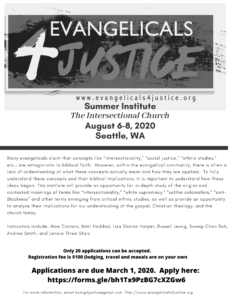Evangelicals 4 Justice seeks to approach theological considerations by way of “centered” over against “bounded” sets.
What is the difference between “centered” and “bounded”? A centered approach focuses on our goals and what brings us together. A bounded set would cause us to focus on the boundaries and who is in and who is out of the movement. Roger Olson says of the bounded set model: “The bounded set model ends up allowing little or no distinction between the center (the gospel) and the boundaries (orthodoxy). It also leads inevitably to obsessive boundary maintenance and inquisitorial judgments about whether persons and groups are Christian or not.” Roger E. Olson, The Mosaic of Christian Belief: Twenty Centuries of Unity & Diversity (InterVarsity Press, 2002). Paul Hiebert has written about the subject of centered and bounded sets in Anthropological Reflections on Missiological Issues (Baker Books, 1994). The centered set approach has a great deal to offer in terms of what we aspire to do together in Evangelicals4Justice (E4J). The hope is that such an approach helps build momentum in view of our shared justice concerns as a diverse network of evangelical thought leaders and activists.
Why does a centered set approach prove more strategic? As a movement, we want to build momentum that accounts for and draws from our diversity within the broad Evangelical tradition. Our diversity is a strength! Focusing on boundaries would likely hold us back in terms of moving forward together in terms of our shared justice aims. Many Evangelical groups frame partnerships in bounded theological categories/sets. While this has its place in certain quarters at various times, it is likely not advantageous for us given our diversity and emphasis not on doctrine as such but on ethics. The centering on the biblical categories of caring for the alien, widow and orphan in their distress provides order and direction, and without having to invest major energies on what distinguishes and perhaps even divides us theologically. While some favor the broad and helpful centering provided by David Bebbington (The National Association of Evangelicals includes this important statement on Evangelicals on their site: http://www.nae.net/church-and-faith-partners/what-is-an-evangelical), for our own purposes, it proves more strategic to frame the discussion in terms of a question: What are the biblical and theological resources that help us prophetically address concerns over the orphan, widow and alien in their distress? While theology is critically important, it makes more sense given our group’s concrete justice aims to discuss how the Bible and theology inform our respective views of applied justice for the orphan, widow, alien, and the like. With this point in mind, we are reminded of Jesus’ challenge to the religious scholar in the story of the Samaritan of exceeding mercy (Luke 10:25-37). Jesus did not tell the religious leader who had come to test him about eternal life to go and think a certain way so that he might live, but to go and act a certain way so that he would live (Luke 10:37).
Follow us on Twitter: @Evang4Justice
Invalid or expired token.Summer Institute

Recent Posts
- Evangelical Perspectives on Israel and Palestine – by Rob Dalrymple
- Indigenous Peoples and Christian Nationalism by Lenore Three Stars
- Recognizing Nationalism by Andrew Cheung
- Ukraine: “Wars and rumors of wars”: a sign of the times, or a sign of all times? A Christian response by Rob Dalrymple
- E4J Annual Zoom Conference: From Conflict to Community, Feb 11-12, 2022